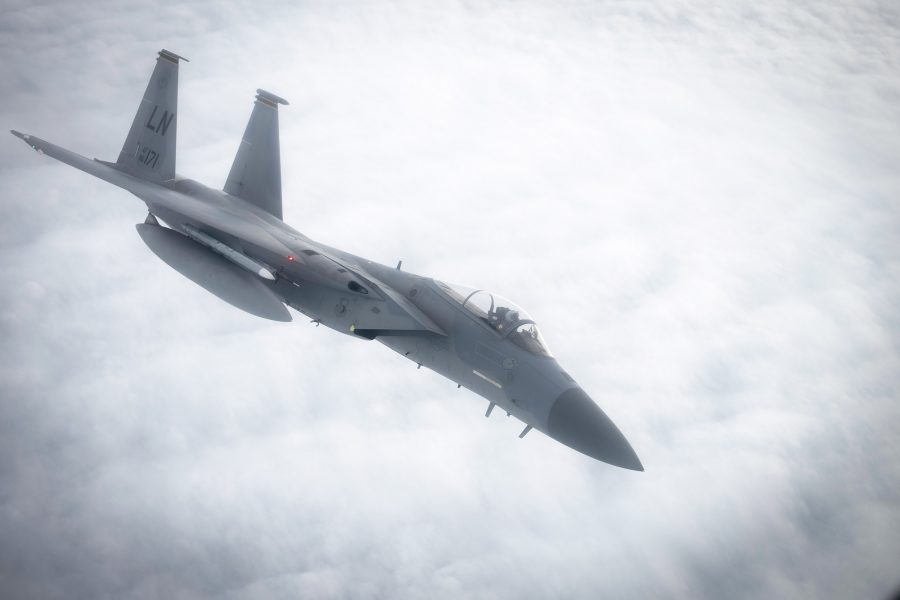The F-15 Eagle has been the world’s dominant, supersonic, all-weather, day/night air-superiority fighter for more than 40 years.
The F-15A first flew on July 27, 1972, and F-15A/Bs were delivered between 1974 and 1979, attaining IOC in September 1975. F-15C/Ds began replacing F-15A/Bs in 1979, offering superior maneuverability, acceleration, range, weapons, and avionics. The C/D incorporates internal EW countermeasures and an added 2,000 lb of internal fuel (with provision for CFTs).

The aircraft accounted for 34 of 37 USAF air-to-air kills during its combat debut in Desert Storm. The final 43 production aircraft received the F-15E’s APG-70 radar, and the subsequent Multi-Stage Improvement Program (MSIP) enhanced its tactical capabilities.
USAF received the first APG-63(V)3 AESA-modified F-15 in 2010, but comprehensive modernization, including the Eagle Passive/ Active Warning Survivability System (EPAWSS) was cut after the decision to replace the fleet with new-build F-15EX. USAF also reduced the number of aircraft slated for MIDS/JTRS upgrades to add higher capacity, jam-resistant Link 16 and UHF SATCOM.
Though two-thirds of F-15C/Ds have exceeded their design lives and suffer performance-limiting structural issues, USAF determined SLEP is not cost-effective and reduced mods to only 63 airframes now continuing through FY24. USAF declared the Legion Pod initially operationally capable and fielded it on Kadena-based F-15s in 2022. Legion IRST gives the F-15 passive detection capability to enable long-range air-to-air engagement without exposing intent to adversary aircraft.
USAF requested to divest 67 aircraft in FY23 ahead of replacement by the F-15EX. The last F-15C/D departed Nellis and Lakenheath in March and April 2022, respectively, leaving Eglin and Kadena the final Active-duty locations. Kadena began F-15 drawdown in late 2022, and USAF plans to backfill with rotational fighters until a final force-structure decision is made.
Contractors: Boeing (previously McDonnell Douglas).
First Flight: Feb. 26, 1979 (F-15C).
Delivered: 1979-85 (F-15C/D).
IOC: 1979 (F-15C/D).
Production: 874.
Inventory: 185 (F-15C); 18 (F-15D)
Operator: AFMC, PACAF, ANG.
Aircraft Location: Barnes Arpt., Mass.; Eglin AFB, Fla.; Fresno ANGB, Calif.; Jacksonville Arpt., Fla.; Kadena AB, Japan; Klamath Falls (Kingsley Field), Ore.; NAS JRB New Orleans, La.; Portland Arpt., Ore.
Active Variant: •F-15C. Upgraded version of the single-seat F-15A. •F-15D. Upgraded version of the two-seat F-15B.
Dimensions: Span 42.8 ft, length 63.8 ft, height 18.7 ft.
Weight: Max T-O 68,000 lb.
Power Plant: Two Pratt & Whitney F100-PW-220 turbofan engines, each 23,450 lb thrust; or two P&W F100-PW-229 turbofan engines with afterburners, each 29,000 lb thrust.
Performance: Speed Mach 2.5, ferry range 2,878 miles (3,450 miles with CFTs and three external tanks; further with air refueling).
Ceiling: 60,000 ft.
Armament: One internally mounted M61A1 20 mm six-barrel cannon (940 rd); four AIM-9 Sidewinders and four AIM-120 AMRAAMs, or eight AIM-120s; in a one-time test, an Eagle successfully launched an anti-satellite missile.
Accommodation: Pilot (C); two pilots (D), on ACES II zero/zero ejection seats.
